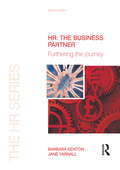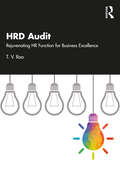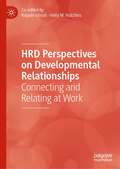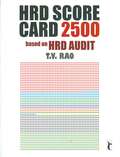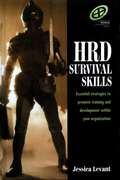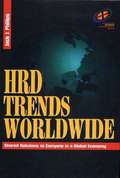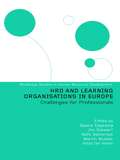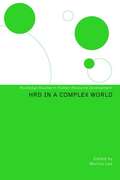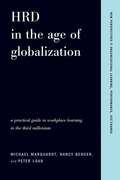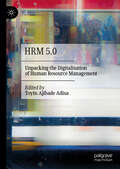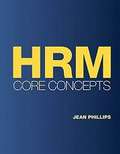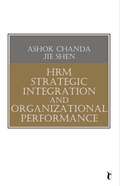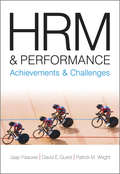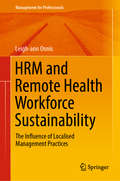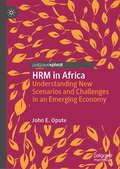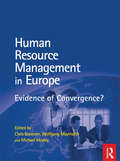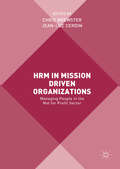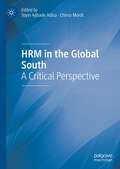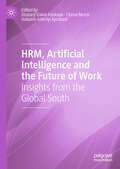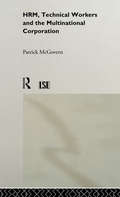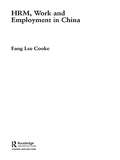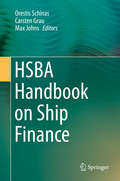- Table View
- List View
HR: Shaping A New Direction (The\hr Series, Ser.)
by Barbara Kenton Jane YarnallWith HR professionals increasingly expected to be “business partners”, are you prepared with the skills and tools to make a positive difference to your organization? As the recognised definitive guide to the topic, HR: The Business Partner, second edition, offers practical insights to take you through the challenging process of business partnering, including: • No-nonsense description of what business partnering entails, with case studies to illustrate real-life practice• Detailed coverage of the common challenges and advice on how to overcome them• Guidance on how to develop the skills and confidence required to work effectively Covering the transition from working operationally to working strategically and the tools, techniques and skill sets needed for partnering, this inexpensive guide will help to both add real value to your business and to develop your career in business partnering. If you are aspiring to or about to embark on a business partner role, this book will provide you with ideas and inspiration for the position.
HRD Audit
by T V RaoHRD Audit provides a framework and methodology that enables corporations to conduct an internal audit of their human resource function. T V Rao presents a unique HRD (human resources development) score card approach that organizations can use to assess and benchmark their level of HRD and its alignment with business goals. This accessible book is illustrated throughout with examples, illustrations, cases, detailed questionnaires and checklists.
HRD Audit: Rejuvenating HR Function for Business Excellence
by T. V. RaoThis book presents the first ever comprehensive approach to evaluating and redesigning Human Resource Development (HRD) function and intervention to maximise their contribution to business excellence.The HRD function recognises the significance of competent and committed people in helping organizations achieve excellence. Studies across the globe have indicated that good HR systems and practices go a long way to make firms effective. Competent employees, top management, HR staff and the HRD climate play a critical role. This book examines how users of HRD are partners in any review and evaluation. It uses multiple methods like interviews with stakeholders, observation, questionnaires, analysis of documents and workshops. The book also outlines key HRD audit methodologies to review and rejuvenate HRD and align it with business excellence including intellectual capital building for the long term.An incisive and invigorating read, this book would be useful to the students, researchers, line managers, CEOs, CXOs and faculty of Human Resource Management, Organizational Behaviour and Applied Psychology. It would also be an invaluable handbook for practising business executives to help them implement the performance management and other talent management systems for leading excellence.
HRD Perspectives on Developmental Relationships: Connecting and Relating at Work
by Rajashi Ghosh Holly M. HutchinsDevelopmental relationships constitute interdependent, generative connections that promote growth and learning among individuals. While studies reporting the impact of developmental relationships on learning, performance, and career development leaves no doubt about its relevance to the human resource development (HRD) field, we lack an in-depth understanding of how developmental relationships apply to the myriad of topics relevant to contemporary HRD research and practice such as social justice, diversity and equity, leadership development, career transitions, knowledge sharing, organization development, employee engagement, organizational learning culture, globalization, national HRD, and technology at work.This book presents a comprehensive collection of evidence-based studies and conceptual articles that explore how developmental relationships that are cultivated within and outside of the workplace apply to those clusters of topics in HRD. Organized around six themes, the chapters examine topics such as knowledge management, critical perspectives on gender, diversity, and equity, building a learning organization, talent development, and emotional closeness in the context of virtual workplaces. In doing so, the book highlight how research on developmental relationships can be the underlying thread connecting the otherwise disconnected varied topical foci of HRD research and practice, thus broadening our understanding of the relevance of developmental relationships within the HRD field.This volume advances HRD scholarship and will appeal to researchers interested in exploring the nature and benefits of developmental relationships including mentoring and coaching.
HRD Score Card 2500: Based on HRD Audit
by T V RaoHRD Score Card 2500: Based on HRD Audit ( HRD Audit was published by Response Books in 1999) presents for the first time a systematic and scientific way of measuring the maturity level of HRD, its systems and strategies, competencies, culture and values, and business impact through a score card. Lucidly written, the book provides a set of easily usable guidelines for assessing HRD with the help of the 2500 point score card. It would serve as an invaluable guide to CEOs and HR chiefs to evaluate and improve their Human Resource. The book is a highly recommended reading for students and faculty of Human Resource Management, Social Work, Business Alignment, and Talent and Personal Management.
HRD Survival Skills (Improving Human Performance Ser.)
by Jessica LevantAt your fingertips is this valuable source of ideas, concepts, and step-by-step activities. Now you can effectively promote the HR training function within your organization. This unique guide shows you how to:* assess and tune up your department's image* promote HRD's added value to the business* appeal to diverse company groups* keep awareness high by staying visible* enhance relationships inside your organization* make sure administration doesn't tarnish your image* capitalize on work with external consultants* determine if the department should sell to a wider marketIn addition, you will find:* insightful case studies* easy-to-organize activities* a training image assessment survey* an inventory of training styles* a customer-focus checklistOverflowing with ideas, 'HRD Survival Skills' supplies your training and development teams with actual examples taken from diverse industries, sectors, and countries. Here's your blueprint to ensure that the services you provide are the right services for your in-house 'customers'.
HRD Trends Worldwide
by Jack J. PhillipsMeet the demands of a competitive worldwide competitive economy. Discover the relevance of these 16 global HRD trends to your organization:* Strategy and training * Needs assessment and analysis* Performance improvement * Corporate universities* Training and delivery * Shared responsibilities* Systematic evaluation * Measuring the return on investment (ROI) * Training costs * Profit centers* Budgeting * Learning objectives* Management partnerships * Technology* Global training programs * Outsourcing Jack Phillips noticed something while consulting for organizations all over the world. He discovered that training and development departments - even though they are in different countries - experience many of the same issues and challenges. He recognized and then researched, sixteen critical global HRD trends.These sixteen noteworthy trends were formulated by surveying thirty-five organizations in various industrialized countries, as well as actually working with training and development departments across the globe. This firsthand global HRD experience verified and brought to life the trends.As a result of the author's investigation, 'HRD Trends Worldwide' outlines each HRD trend and helps you thoroughly understand them all and, more importantly, put them to good use.This text presents the survey results and explains each trend through examples and evidence. To help you work with the trends, the text provides an examination of each trend's potential impact on your training and performance improvement functions.Every HRD and training and development professional interested in meeting the demands of a competitive worldwide economy should make reading this book a priority.
HRD and Learning Organisations in Europe
by Jim Stewart Martin Mulder Sally Sambrook Saskia Tjepkema Hilde Ter Horst'Lifelong learning' is moving from buzzword to reality for ever latger numbers of workers. Firms increasingly need their workers to be active, self-directed learners who contribute to innovations and improvements of processes, products and services. Companies that explicitly encourage and support worker learning, from a strategic perspective, are c
HRD in a Complex World (Routledge Studies in Human Resource Development #Vol. 6)
by Monica LeeHuman Resource Development in a Complex World presents a strong challenge to traditional Human Resource Development. Internationally renowned authors address HRD from within the notions and language of complexity, presenting multifaceted alternative perspectives to the current practice and theory of HRD.
HRD in the Age of Globalization: A Practical Guide To Workplace Learning In The Third Millennium (New Perspectives in Organizational Learning, Performance, and Change)
by Michael Marquardt Peter Loan Nancy BergerThe pro- and anti-globalization forces may be logically at odds, but there's little dispute on the inevitability of globalization's forward march. And as Michael Marquardt, Nancy Berger, and Peter Loan explain, the real issue is not stopping or promoting globalization, but rather how to minimize the negative effects of globalization and leverage its powerful, positive effects. Human Resource Development will play a key role in determining this transformation. At no time in history has HRD been more critical in solving urgent economic and social problems faced by a wide array of groups, communities, organizations, and nations. HRD in the Age of Globalization explores the best HRD programs in twelve geographic regions and their impact on culture, the global environment, and other geopolitical and demographic elements. This book not only answers all the questions that exist concerning this burgeoning field-it tells us what questions we should be asking.
HRM 5.0: Unpacking the Digitalisation of Human Resource Management
by Toyin Ajibade AdisaTechnology has affected almost all organisations in terms of process, procedures, and management and many organisations now seek technologically minded people to run their business at every level. It has also created new realms of employment, such as platform and virtual work, where HRM must play a part if employee wellbeing is to be preserved. This book sheds light on the current reality and future expectations of digital HRM and fills a gap in the existing literature of empirical studies into the forefront of HRM around the world. It will cover topics on algorithmics, artificial intelligence, and digitalisation of HRM practices and will be of great value to academics, international and domestic business organisations, policy makers, and undergraduate and postgraduate students.
HRM Core Concepts
by Jean M. PhillipsThis 14-chapter book easily aligns with most instructors’ syllabi, and concise, uncluttered chapters that students will find to be fast reads before class. The text will help you understand how to use HRM to hire, develop, motivate, and retain the right people and bring out the best in employees to execute the company’s business strategy and secure a competitive advantage. The book discusses the roles of HRM professionals, managers, and employees in the design and implementation of effective HRM systems, and include many current examples of how HRM is executed in organizations, and therefore, is intended for those who are or who might become a manager or an HRM professional.
HRM Strategic Integration and Organizational Performance (Response Books)
by Jie Shen Ashok ChandaHuman Resources Management (HRM) has a very important facilitative and strategic role in organisational success. Several financial and non-financial performance measures of an organisation are positively related to its levels of HRM Strategic Integration (HRMSI). This book develops a better understanding of strategic HRM and its impact on organisational performance. HRM Strategic Integration and Organizational Performance proposes a framework for HRMSI that helps formulate and implement the integration of strategic HRM in organisations for enhanced organisational performance. The key features of the book are: " A detailed analysis of strategic integration practices like recruitment and selection, performance management, training and development, rewards and recognitions and employees relations. " A thorough literature review on the relationship between HRM, strategic HRM and performance. " New research data from a huge cross section of the industry and high-end statistical research analysis using structural equation modelling. " A template of step-by-step HRMSI methodology to help future academics and professionals. The book will serve as an ideal reference material for scholars of human resources and business strategy. It will also be an invaluable guide for implementers of strategic HRM and students of management and business.
HRM and Performance: Achievements and Challenges
by Jaap Paauwe Patrick Wright David E GuestThe link between HRM and performance has become an important policy issue at both a national and a corporate level. HRM and Performance draws on the knowledge and expertise of a number of leading international scholars in the field of HRM to provide a comprehensive overview of the current state of HRM and identify fruitful directions for theory, research and practice. A central question throughout is - what's next for HRM and what are the keys to the future of managing people and performance?
HRM and Remote Health Workforce Sustainability: The Influence Of Localised Management Practices (Management for Professionals)
by Leigh-Ann OnnisThis book examines the characteristics of sustainable remote health workforces and how management practices influence workforce sustainability in remote regions. It introduces the Integrated Human Resource Management (HRM) Framework for sustainable remote health workforces, providing a contemporary approach to remote health workforce sustainability.The book particularly focuses on the influence of localised management practices on workforce sustainability. For geographically remote managers, the book offers evidence-based information for developing effective management practices drawn from three separate, yet related research studies. This book will be of interest to managers and aspiring managers, working or planning to work in geographically remote regions across the globe. The book provides insight into the human resource management challenges for remote managers, and provides resources and practical management tools as well as suggestions about how managers can create their own localised management practices.
HRM in Africa: Understanding New Scenarios and Challenges in an Emerging Economy
by John E. OputeThis book explores the effective management of HR functions in an African context. While previous research has thoroughly explored central issues such as staffing, benefits, employee relations, and HR compliance, other topics such as appraisals, promotion, succession planning, and exits have rarely been considered. The author draws on empirical research and incorporates contextual issues such as technology, politics, culture, and economics to enrich readers’ understanding of HR in Africa’s emerging economies. By highlighting theoretical underpinnings while also placing emphasis on the practical relevance of HR issues, this book offers an insightful guide for students and scholars interested in HR and management in developing economies.
HRM in Europe
by Michael Morley Chris Brewster Wolfgang MayrhoferThe increasing number of cross-border alliances and mergers both within Europe and between Europe and other parts of the world have made it imperative for students of management to have a thorough understanding of the European context for human resource management (HRM). This book enables managers and students to become "fluent" in the many various environments, approaches and practices that exist across Europe for managing human resources.The text employs comprehensive comparable representative data collected longitudinally during the last decade and it also draws directly on the expertise of leading HRM scholars. Entirely fresh analyses of HRM in Europe, based on new and hitherto unpublished data are presented and this analysis is critically important for students, researchers and also for practitioners. The book is divided into three parts: concepts and theoretical issues , trends in relation to these issues and comparisons between individual countries, and summaries and conclusions on the issue of convergence and divergence.
HRM in Mission Driven Organizations
by Chris Brewster Jean-Luc CerdinThis edited collection examines human resource management in organizations other than those that are set up to make a profit. Covering human resource management in a number of different kinds of mission-driven organizations, the book explores organizations in sectors and industries such as the governmental and intergovernmental public sector, volunteer organizations and charities, religious organizations, cultural organizations, sports organizations and B-corporations. Recognizing the reality of management practice in the (many small) organizations covered by the book, the chapters deal with the way that people are actually managed whether or not there is an HRM department present. Students of business management and human resource management will find this book invaluable as a source of knowledge on not for profit organizations, as many of the chapters include detailed examples and case studies.
HRM in the Global South: A Critical Perspective
by Toyin Ajibade Adisa Chima MordiThis edited collection offers an insight into the dynamic of HRM in thirteen developing countries across Africa, Asia, and the Middle East. Taking readers through the realities of HRM in the global South, the book identifies the significance of contexts, diversity of cultures, and dissimilarity of processes in managing people. In other words, the book addresses general issues of HRM in cross-national settings to give readers an understanding of HR that is comparative and country-specific. Covering issues in Nigeria, South Africa, Egypt, China, India, Pakistan, Malaysia, Bahrain, Jordan, United Arab Emirates, and Argentina, each chapter draws out the unique and diverse configurations of HRM in each country. Also examining digital HRM, technology-based entrepreneurship, gig work, artificial intelligence and digitalization in business practice, this book is an invaluable resource for all HRM practitioners, policymakers, students, HRM scholars, international HRM, international business, and business managers across the globe.
HRM, Artificial Intelligence and the Future of Work: Insights from the Global South
by Chima Mordi Hakeem Adeniyi Ajonbadi Olatunji David AdekoyaThe rise of artificial intelligence is having a profound impact on human resource management, as AI is being used to automate a wide range of HR tasks and functions, from recruiting and onboarding to performance management and compensation. However, the impact of AI on HRM is not evenly distributed. Due to a variety of factors, the Global South is lagging behind the Global North in terms of AI adoption, creating a widening disparity in the effectiveness and efficiency of HR operations. This edited book explores HRM, artificial intelligence and the future of work in the Global South. It addresses key elements of how technology is transforming the workplace and people management, including HR automation, robotisation, big data analytics, smart systems, virtualisation, AI, machine learning and the Internet of Things. The chapters offer a collection of cases from various Global South countries, draw on various types of research (empirical, review papers, conceptual and theoretical) andincorporate contextual issues such as technology, politics, culture, ethics and economics. Despite the relatively slow adoption of AI in the Global South compared to developed nations, its potential impact on the future of work remains significant, particularly in shaping the role of HR as a bridge between technology and human resources. This book will be a valuable resource for scholars, students and policymakers interested in the future of work in the Global South, as it brings together critical insights from scholars and practitioners from the region, providing a much-needed perspective on this important issue.
HRM, Technical Workers and the Multinational Corporation (Routledge Advances in Management and Business Studies)
by Patrick McGovernThis book is the first major in-depth study of the impact of contemporary management practices on a rapidly expanding set of white-collar occupations, namely technical workers. It investigates whether HRM schemes such as employee appraisals and performance related pay have transformed technical work to such an extent that it can no longer be described as a 'service contract'. The book contains detailed examination of the nature of managerial control over employees who, by virtue of their committment, present their employers with problems that are often ignored by prescriptive models of HRM. The empirical evidence features case studies of matched pairs of hi-tech firms in the Irish Republic. The author examines recent debates about the nature of employment and the role of the multinational corporations within the so-called 'Celtic Tiger' Irish economy.
HRM, Work and Employment in China
by Fang Lee CookeDuring recent years there has been a growing interest in the way patterns of employment relations are changing in China. This up-to-the-minute book reviews the policy and practice of human resource management, work and employment in China over the last fifty years at both the macro and micro level. It fills the gaps in existing literature by addressing a number of thematic issues: the growing inequality in employment public sector reform pay systems vocational training. It explores, contemplates and reveals this dynamic subject through a combination of rigorous research and first-hand interviews with Chinese practitioners, and is a valuable resource for anyone with an interest in Chinese society, Asian studies, comparative studies, human resource management, international business and employment relations.
HSBA Handbook on Ship Finance
by Carsten Grau Orestis Schinas Max JohnsThis book is a major work that focuses exclusively on ship finance and includes contributions on the increasingly complex field of ship finance, which has over the last two decades become a key aspect in the world of shipping and ship owning. The book offers an enlightening mix of theoretical analysis and well-founded practical insights into the daily markets. Given that ship finance continues to develop dynamically around the world, the book covers subjects ranging from the German KG market to Islamic Finance, from loans to legal aspects and from asset pricing to risk management.
HSBC Holdings
by David Lane Tarun KhannaIllustrates the challenges of managing a global business enterprise. A rewritten version of an earlier case.
HTC Corp. in 2009
by David B. Yoffie Renee KimTaiwan-based HTC Corp. had emerged as the world's fourth largest smartphone manufacturer by 2009. CEO Peter Chou was extremely proud of the remarkable achievements his company had made over the last 12 years since starting off as an unknown manufacturer of PDAs for other companies. Yet Chou faced several decisions in order to move his company forward. Competition for high-end, sophisticated mobile devices was intensifying as HTC faced big name players such as Nokia, Apple, and Samsung Electronics. Many companies were offering their own application stores. What did HTC have to do to become a more powerful global brand? Where should HTC participate in the value chain in one of the most exciting, innovative product categories in the technology world?
